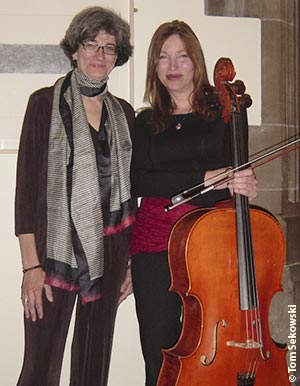 |
Frances-Marie Uitti & Sharon Kanach Scelsi in Words and Music
part of SoundaXis '08 |
|
| May 28, 2008 • Hart House • Toronto |
|
|
|
|
Rediscovering a Master
Report and photo by Tom Sekowski |
| It was a night like no other. Within a few hundred feet of the University of Toronto’s Hart House, another Scelsi event was being staged. So why exactly did I choose to attend this particular reading of the master’s words and music? Was it the curiosity in hearing how his written word would be translated in a live scenario? Or was it simply the fact that both of the performers were at one point avid disciples of his teachings? Whatever the case, I was in for a real treat. |
| Why was this concert so special, you ask? In the context of Scelsi’s music, the two performers are very intimately linked to the world of this Italian composer. While Sharon Kanach was Scelsi’s musical assistant during the last ten years of his life (late 70’s to late 80’s), cellist and composer Frances-Marie Uitti worked closely with the composer in transcribing and bringing to life a number of his important cello works. Furthermore, Kanach is responsible for coordinating publication of a trilogy of collections of Scelsi’s writings — texts, poetry, and memoirs. (English translation of these volumes is coming out shortly in the form of a single collection.)
The concert was broken up into three sections. First came “Le Fleuve Magique”, the first part in a diptych Voyages. It came about as a result of an improvisation that Uitti made with Scelsi. While Kanach read bits of Scelsi’s writings, Uitti sat still, waiting for her cue to play. Then, she broke into the most stunning sorts of glissando work imaginable. Her bow caressed the strings on her cello in a most unimaginably graceful way. Her playing was delicate, barren and still, beat with a life that lifted the spirits high.
|
|

Sharon Kanach & Frances-Marie Uitti |
|
| “Ygghur” was presented in three movements. This was that final piece of Scelsi’s Trilogia for solo cello. Uitti’s facial gestures told the whole story. As she winced, as she closed her eyes, she was completely and utterly giving herself over to the music of the man she so much admires. She was transported to another time and place, a quarter century ago, when she was bringing Scelsi’s music back from the dead. You could feel the spirit of the composer in the room. There was nothing but an avid sense of creativity, total commitment and an unmistakable feeling Uitti gave herself over to this art in the most absolute fashion.
The final piece “Il Allait Seul” (second part of Voyages) was as graceful and powerful as the previous parts. What I enjoyed the most was the insight the listeners got into Scelsi’s life and his written work. Kanach read over and over again about the purpose of art. Her clear and direct tone helped to set the stage for the texts she read. In one key passage, Scelsi was pondering quite bluntly the purpose of art, especially its purpose after the artist passes away. What is life but art in a nutshell?
Uitti is certainly one of Scelsi’s greatest disciples. Her warm interpretations and her passion were evident with every swing of her bow across the strings. There were a couple of brief improvised sections and I could whine about how I wish there were more included in the program. (This was the woman whose 2 Bows recording from the mid 90’s changed my life. This was the same composer whose technique of playing cello with two bows saw new possibilities open up for her chosen instrument.) Then again, this night was devoted to Scelsi’s work. Both Kanach and Uitti put him at the centre of everything that was said and played this night. A hearty round of applause at the concert’s end was well deserved. As the two performers retired from the stage, I literally had tears welling up in my eyes. Rarely had I heard music that was as fiery, as humane as this. Bravo!
|
|
|
|
|
|


